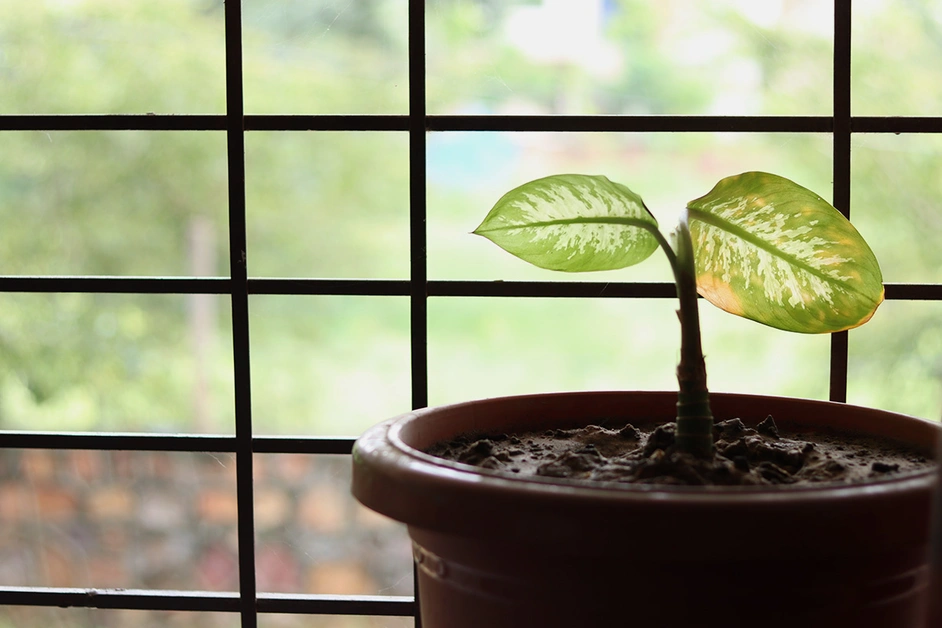Top 15 Vastu Plants for Positive Vibes, Money and Luck

This comprehensive guide to Vastu plants unveils the secret between nature and positive energy within your living space. Like a carefully sown seed, this guide blossoms with insights, bringing forth not just greenery but a harmony that resonates with Vastu Shastra principles. Discover how the placement and choice of plants can cultivate an environment teeming with hope, tranquillity, and a touch of the divine.
What is Vastu for Plants at Home?
According to Vastu experts, indoor plants are more than just visually appealing; they play a vital role in energising and enhancing the overall atmosphere of a living space. The belief is that strategically positioning plants in the right direction contributes to the positivity, tranquillity, and well-being of the house. In addition to their aesthetic value, plants aid in detoxifying the environment by absorbing carbon dioxide. Therefore, Vastu Shastra advises individuals to choose plants carefully and place them thoughtfully to ensure a harmonious and positive living environment.
Recognising the symbolic significance of planting a seed as a gesture of hope, Vastu Shastra encourages individuals to consider the environmental and psychological benefits of having greenery indoors. The absorption of carbon dioxide by indoor plants aligns with Vastu principles, reinforcing the idea that plants are more than just decorations—they actively contribute to the well-being of the residents. Thus, integrating Vastu's recommendations into the choice and arrangement of plants can foster a green and peaceful environment.
Importance of Plants in Vastu
Plants hold significant importance in Vastu, where growing certain auspicious plants is believed to attract positive energy and good fortune to the home. The strategic placement of these plants is crucial to harness their maximum benefits, as placing them in the wrong direction may result in adverse effects. Therefore, understanding both the types of auspicious Vastu plants and their proper placement is emphasised to ensure a wholesome and positive environment within the home.
According to Vastu principles, cultivating auspicious plants enhances air quality and contributes to overall happiness, physical and mental wellness, harmonious relationships, prosperity, success, and career and business growth. Additionally, the presence of these plants is thought to offer protection against the influence of evil eyes, emphasising the holistic impact of incorporating Vastu-friendly greenery into the home.
15 Vastu Plants for Home and their Best Directions
This guide explores 15 must-have Vastu plants, delving into their unique benefits and the optimal Vastu directions for placement to invite good luck and positive vibrations into your living space.
Aloe Vera Plant
Aloe vera, known for its healing and medicinal qualities, is considered a harbinger of good luck and positive energy in Vastu. Placing the aloe vera plant in the east or north of the house aligns with Vastu principles. Additionally, positioning it within a few feet of electronic devices is suggested to filter electromagnetic energies, enhancing its protective properties.
Tulsi (Holy Basil) Plant
Regarded as a form of the goddess Lakshmi, the Tulsi plant holds immense significance in Vastu. Placing it in the east or on the balcony, near the window in the north, is recommended. Tulsi is believed to bring harmony, happiness, and spiritual well-being to a home.
Golden Pothos/Money Plant
Known for symbolising wealth and prosperity, the money plant is suggested to be placed in the southeast of the living room according to Vastu. This placement aligns with the southeast being associated with Ganesha, the god of prosperity, attracting positive energies. However, caution is advised against placing the money plant in the northeast.
Lucky Bamboo Plant (Dracaena Sanderiana)
Lucky bamboo is considered auspicious in Vastu Shastra, bringing good luck, wealth, and fortune. Placing it in different directions yields various benefits, such as wealth in the southeast and well-being in the east. The number of stalks also holds significance, with six-stalk plants attracting prosperity, seven-stalk symbolising good health, and eight-stalk promoting growth and prosperity.
Rubber Plant
Representing wealth and fortune, the rubber plant brings abundance when placed in the southwest corner of the living room. Apart from its prosperity-inducing properties, it also serves as an air-purifying plant, removing toxins and improving air quality.
Jade Plant
The jade plant is associated with positive energy, growth, and prosperity in Vastu Shastra. Placing it in the east, southeast, west, or northwest directions is recommended. A strategic location, such as near the entrance or on the dining room table reflected in a mirror, is believed to invite success and blessings.
Snake Plant
Known for spreading positive energy and purifying the air, the snake plant is suggested for placement in the southeast, according to Vastu. Beyond its air-purifying qualities, it reduces stress and contributes to a positive ambience. Placing it near a window enhances oxygen flow, making it an ideal bedroom plant.
Peony Plant
A flowering plant with potential Vastu benefits, the peony is renowned for strengthening relationships and mending broken bonds. This lovely plant is thought to eliminate negative energies, attracting positivity and optimism. Believed to promote reproductive health for women, the peony is recommended for homes facing relationship challenges. Placing it in the southwest corner is optimal for Vastu benefits, offering a harmonious and positive impact on the household.
Lotus Plant
An aquatic plant associated with prosperity, peace, good luck, and positivity, the lotus is revered in Vastu Shastra. Symbolising ultimate purity and sacredness to Buddhists, the lotus plant is believed to bring spiritual enlightenment. As per Vastu's recommendations, placing the lotus at the entrance of the house maximises its impact, aligning with its symbolic significance and bringing auspicious energies to the space.
Orchid Plant
Symbolising success and abundance, orchids add elegance to indoor decor while radiating an aura of prosperity. Orchids invite good fortune and harmony into the home. They are esteemed symbols of flourishing growth for the entire family, making them a fitting addition to your living space. Consider placing them in areas that resonate with positive energy to maximise their impact.
Peace Lily Plant
Symbolising love, peace, and harmony, the peace lily is recommended for placement near a bedroom window. This fosters peaceful sleep and benefits those with insomnia. Recognized as an air-purifying plant, it keeps negative energy at bay, contributing to a serene living space.
Lavender Plant
Celebrated for its aroma and therapeutic qualities, lavender promotes good health, happiness, and relaxation. According to Vastu Shastra, placing the lavender plant in the north, or east, attracts calms frayed nerves. It's particularly suggested for bedrooms to improve marital happiness.
Jasmine Plant
The fragrant jasmine plant, known for attracting positive energy and calming nerves, is recommended for placement near a south-facing window. Beyond its aromatic qualities, jasmine is believed to maintain harmony in romantic relationships and is considered a much-loved flower of Lord Vishnu and Lord Shiva.
Rosemary Plant
Rosemary, an aromatic herb native to the Mediterranean and Asia, is known in Vastu Shastra for promoting mental and physical well-being. Its fragrant leaves, commonly used for culinary purposes, elevate moods, alleviate weakness, reduce stress and anxiety, enhance memory, and promote sleep. With no specific placement restrictions, Rosemary can be positioned anywhere in your home, making it a versatile Vastu plant to dispel negative energy and invite positivity.
Chrysanthemum Plant
Symbolising happiness, optimism, and good luck, the chrysanthemum is recommended for the living room, bringing positive energy and well-being. However, Vastu advises against placing it in the bedroom, emphasising its suitability for communal spaces.
Best Vastu Plants for Kitchen
Incorporating Vastu-friendly plants into the kitchen adds a touch of greenery and is believed to influence the energy and vibes of this essential space positively.
- Green Chili
Green chilli, known for its fiery flavour, is believed to bring positive energy to the kitchen. In Vastu, it is associated with prosperity and the warding off of negative energies. Placing a green chilli plant in the kitchen is thought to infuse vibrancy and enthusiasm into the cooking space.
- Coriander
Coriander, a common herb in culinary practices, is considered auspicious for the kitchen in Vastu. Beyond its culinary uses, coriander is believed to attract positive energy and enhance the overall atmosphere of the kitchen. It is associated with promoting good health and well-being.
- Mint
Mint, with its refreshing aroma, brings a sense of freshness to the kitchen. In Vastu, mint is associated with prosperity and is believed to help maintain a calm and positive environment. Placing a mint plant in the kitchen encourages a soothing atmosphere during meal preparation.
- Nag Champa
Nag Champa, a fragrant flowering plant, is revered for its aromatic properties. In Vastu, it is believed to create a spiritually charged and harmonious environment in the kitchen. Nag Champa is associated with promoting peace and tranquillity, making it a favourable addition to the culinary space.
- Rose
Beyond its beauty, the rose plant holds significance in Vastu for the kitchen. Roses are associated with love, harmony, and positive energy. Incorporating a rose plant in the kitchen is believed to infuse the cooking space with a sense of warmth and affection.
- Champa
Champa, known for its fragrant flowers, is considered an auspicious plant in Vastu. It is believed to attract positive energy and enhance the overall ambience of the kitchen. The sweet fragrance of Champa is thought to create a soothing atmosphere during cooking activities.
- Bakul
Bakul, with its aromatic blossoms, is associated with positive energies in Vastu. Placing a Bakul plant in the kitchen is believed to bring joy, happiness, and prosperity. The sweet fragrance of Bakul is thought to create a pleasant and uplifting atmosphere in the culinary space.
- Kesar (Saffron)
Kesar, known for its aromatic and culinary uses, is considered auspicious in Vastu for the kitchen. It is believed to attract positive energies and enhance the overall well-being of the household. Placing a Kesar plant in the kitchen is associated with prosperity and good fortune.
- Chameli (Jasmine)
Chameli, or Jasmine, is renowned for its fragrant white flowers. In Vastu, it is believed to attract positive energies and create a harmonious atmosphere in the kitchen. The sweet fragrance of Chameli is associated with promoting positivity and well-being.
- Parijata
Parijata, also known as the Night Jasmine, is considered auspicious in Vastu for the kitchen. It is believed to bring positive vibrations and good fortune. The sweet fragrance of Parijata is thought to enhance the overall energy of the kitchen, creating a conducive environment for cooking and dining.
Vastu Plants to Avoid at Home
While the allure of indoor plants is undeniable, Vastu Shastra cautions against certain choices that may inadvertently invite negative energies into your home.
Bonsai
Despite their artistic appeal, Bonsai plants are deemed inauspicious in Vastu, believed to bring bad luck. Their stunted growth symbolises slow progress and can interfere with the life cycle of the inhabitants. It is recommended to avoid placing Bonsai plants anywhere in the home and consider them more suitable for open spaces like gardens or verandahs.
Cotton Plant
While snowy white cotton plants may seem visually pleasing, Vastu discourages their placement indoors. Cotton plants are believed to bring bad luck and are inauspicious for home decor. Opting for more auspicious indoor plants that align with positive energies is advisable.
Mehendi (Myrtle)
Despite their cultural significance on auspicious occasions like weddings, Mehendi or Myrtle plants are believed to harbour negativity. Vastu advises against keeping these plants at home, as they are thought to attract evil spirits.
Cacti or Other Thorny Plants
Plants with thorns, including cacti, are considered a strict no-no in Vastu Shastra. These plants are believed to lead to disputes among family members and can transmit negative energies. While they can be strategically placed to fight negative energy at home, it's essential to exercise caution in their positioning to avoid potential conflicts.
Dead or Decaying Plants
Dead or decaying plants signify ill health and carry negative energy, according to Vastu principles. It is advised to promptly remove any plants that are in a state of decline. Ensuring that indoor plants look fresh and vibrant and bear blooming flowers aligns with the positive energy Vastu encourages.
Climbers/Creepers
In Vastu Shastra, climbers and creepers, when allowed to grow on building walls, may bring structural concerns. Their clingers can infiltrate tiny cracks, leading to damage and water seepage, believed to attract negative energies. Vastu recommends growing these plants with independent support to maintain a harmonious balance, ensuring the aesthetic charm aligns with positive energy flow in the living space.
Vastu Tips for Plants at Home
- Avoid planting trees in the northeast corner of your house.
- Be cautious with sap-releasing plants, as they may not align with Vastu principles.
- Keep large trees like banyan or peepal at a distance to prevent potential foundation damage.
- Ensure the growth of large trees doesn't obstruct morning sunlight.
- Plant coconut trees in the southwest direction, avoiding shadows on your home.
- Opt for indoor plants like rosemary, lavender, and jade for positive vibes.
- Place money plants in the southeast corner for financial well-being.
- Use vibrant and healthy plants to enhance the overall aesthetic appeal of your home.
Benefits of Keeping Vastu Plants at Home
- Negative Energy Removal: Plants serve as natural purifiers, effectively cleansing the home's aura by absorbing and neutralising negative energies. This not only enhances the overall well-being of the residents but also creates a refreshing and revitalised living environment.
- Balance and Energy Flow: The strategic placement of plants aids in maintaining a balanced energy flow within the house, fostering a sense of equilibrium. Their presence encourages positive vibes to circulate freely, creating a harmonious atmosphere that positively impacts the occupants' physical and mental states.
- Healing Properties: When nurtured in the correct direction, certain plants are believed to possess healing properties. Their presence is thought to contribute to a healthier living space, potentially preventing and alleviating ailments. Caring for these plants also fosters a nurturing and therapeutic connection with nature.
- Auspicious Plant Positivity: Auspicious plants act as magnets for positive energy, happiness, and prosperity. Placing these plants strategically in the home is thought to invite good fortune, financial well-being, and an overall positive vibe. They become symbolic sources of positivity, radiating beneficial energies.
- Evil Spirits Dispelling: In Vastu Shastra, plants are seen as protectors against evil forces. Their presence is believed to create a shield, dispelling evil spirits and safeguarding the home. This aspect adds a layer of psychological comfort and security, contributing to a serene and protected living environment.
Vastu Plants at Home: Do's and Don'ts
Do's:
- Use potted plants to spread positive energy throughout your home.
- Opt for planting trees in pairs of 2, 4, or 6 to enhance positive vibrations.
- Regularly remove dried leaves from plants to maintain cleanliness and positive energy flow.
- Place a tulsi plant next to thorny plants or trees to nullify negative effects.
- Consider incorporating vibrant and healthy indoor plants like snake plants and peace lilies for improved indoor air quality and positive vibes.
- Place aromatic plants like lavender or jasmine near windows or entryways to enhance the fragrance and attract positive energy.
- Arrange plants in the southeast direction of your home to invite financial prosperity and success, according to Vastu principles.
- Rotate and reposition indoor plants occasionally to ensure uniform exposure to sunlight to maintain their vitality.
Don'ts:
- Avoid keeping broken or chipped pots, as they can attract negative energies.
- Refrain from hanging plants on windows, as they may block positive energy from entering your home.
- Don't plant trees in the northeast corner of your house.
- Avoid planting large trees like banyan or peepal too close to your home to prevent potential structural damage.
- Do not overlook the daily removal of dried leaves and resist keeping dried or withering plants, as neglecting this may disrupt the positive energy flow.
Some Vastu Tips for Decorating Home With Plants
- Positive Energy Plants: Choose plants known for spreading positive energy, such as money plants, bamboo, peace lilies, or snake plants.
- Grouping Trees: Plant trees in pairs or groups of four or six for better Vastu. This arrangement is believed to enhance positive vibrations.
- Daily Maintenance: Remove dry leaves from Vastu plants daily to maintain clean and vibrant energy in your home.
- Flowing Water: Pair Vastu plants with flowing water, either through a fountain or a small pond. This combination is thought to attract positive energy.
- Thorny Plant Solution: If unable to remove a thorny plant or tree, counter its negative effects by placing holy basil (Tulsi) next to it. Holy basil is believed to have protective properties.
Conclusion
Adhering to Vastu principles when incorporating plants into home decor is not just about aesthetics but also about fostering positive energy.
What is Vastu for plants at home?
Vastu Shastra recommends specific placements for plants within a home to harness positive energy. Ideal directions include the east and southeast, while caution is advised against placing plants in the northeast corner. Following these guidelines ensures a harmonious energy flow throughout the living space.
Importance of plants in Vastu
Plants play a vital role in Vastu Shastra by acting as natural energy purifiers. Their presence symbolises growth, renewal, and abundance, contributing to a balanced and positive atmosphere. Vastu emphasises the importance of incorporating plants to enhance the overall well-being of the household.
15 Vastu plants for home and their best directions
Aloe Vera in the kitchen promotes health, while Tulsi fosters spiritual well-being. Golden Pothos in the southeast attracts financial prosperity, and Lucky Bamboo in the east or southeast stimulates growth. Rubber Plant, Jade Plant, and Snake Plant contribute to a harmonious atmosphere. Peony, Lotus, Orchid, and Peace Lily add beauty and positivity. Lavender, Jasmine, Rosemary, and Chrysanthemum further enhance the overall Vastu balance, creating a vibrant and positive living environment.
Best Vastu plants for kitchen
Green chilli, coriander, mint, and other aromatic plants are recommended in the kitchen, as per Vastu. These plants not only add flavour to your dishes but also contribute to the overall positive energy in the cooking space.
Vastu Plants to avoid at home
Bonsai, cotton plants, mehendi, thorny plants like cacti, dead or decaying plants, and climbers/creepers should be avoided indoors to maintain a positive living environment.
Vastu tips for plants at home
- Plants in pairs or groups of four or six enhance positive energy.
- Regularly remove dry leaves from Vastu plants.
- Pair plants with flowing water, like fountains or small ponds, to attract good energy.
- Counter the negative effect of thorny plants with holy basil placed nearby.
Benefits of keeping Vastu plants at home
- Plants cleanse the aura and remove negative energy.
- They contribute to a balanced energy flow.
- Auspicious plants attract positivity, happiness, wealth, and money.
- Plants are believed to ward off evil spirits.
Vastu plants at home: Do's and Don'ts
- Do place plants in favourable directions.
- Avoid thorny plants indoors.
- Do keep plants well-maintained.
- Don't place plants in the northeast corner.
Some Vastu tips for decorating home with plants
- Use plants that spread positive energy in home design.
- Grow trees in pairs or groups for balance.
- Regularly remove dry leaves for cleanliness.
- Pair plants with flowing water for enhanced positivity.
- Counter thorny plants with the presence of holy basil.
FAQ's
In Vastu, placing plants strategically is crucial. The east and southeast directions are favourable, while the northeast corner should be avoided. This ensures a harmonious flow of energy, promoting well-being and positivity in the household.
Plants serve as natural energy purifiers, contributing to a healthy living environment. They represent growth, renewal, and abundance, aligning with Vastu principles to create a space conducive to prosperity and well-being.
To optimise Vastu benefits, choose plants that thrive in specific directions. Regularly prune and care for them, removing dry leaves promptly. Avoid placing thorny plants indoors to prevent the introduction of negative energy inside the house.
Money plants are associated with wealth and fortune, bamboo brings growth and stability, and tulsi is considered sacred, imparting positive energy. These plants are recommended to enhance the overall Vastu balance.
Thorny plants like cactus are discouraged indoors as they are believed to generate negative vibrations. Eliminating such plants aligns with Vastu principles to foster a more harmonious and positive home atmosphere.
Aloe vera, basil, or mint are recommended for kitchens as they bring positive energy and are believed to have health benefits. Incorporating these plants aligns with Vastu principles, promoting overall well-being.
Yes, we can keep snake plants at home as they are known for spreading positive energy and purifying the air. Placing it near a window enhances oxygen flow, making it an ideal bedroom plant.
Apart from their aesthetic appeal, plants purify the air, reduce stress, and create a positive ambience. They contribute to a prosperous and harmonious living space, aligning with the holistic principles of Vastu Shastra.
Position plants in auspicious directions, ensuring they do not obstruct pathways. Regularly care for plants, keeping them well-maintained. Don't place thorny plants indoors or let them overshadow crucial areas, adhering to Vastu guidelines.
Pairing Vastu plants with flowing water, like a fountain or small pond, enhances the positive energy they bring. Placing plants in pairs or groups of four or six promotes balance and symmetry, contributing to an aesthetically pleasing and energetically harmonious home decor. Aligning these practices with Vastu principles ensures a well-balanced and positive living space.









